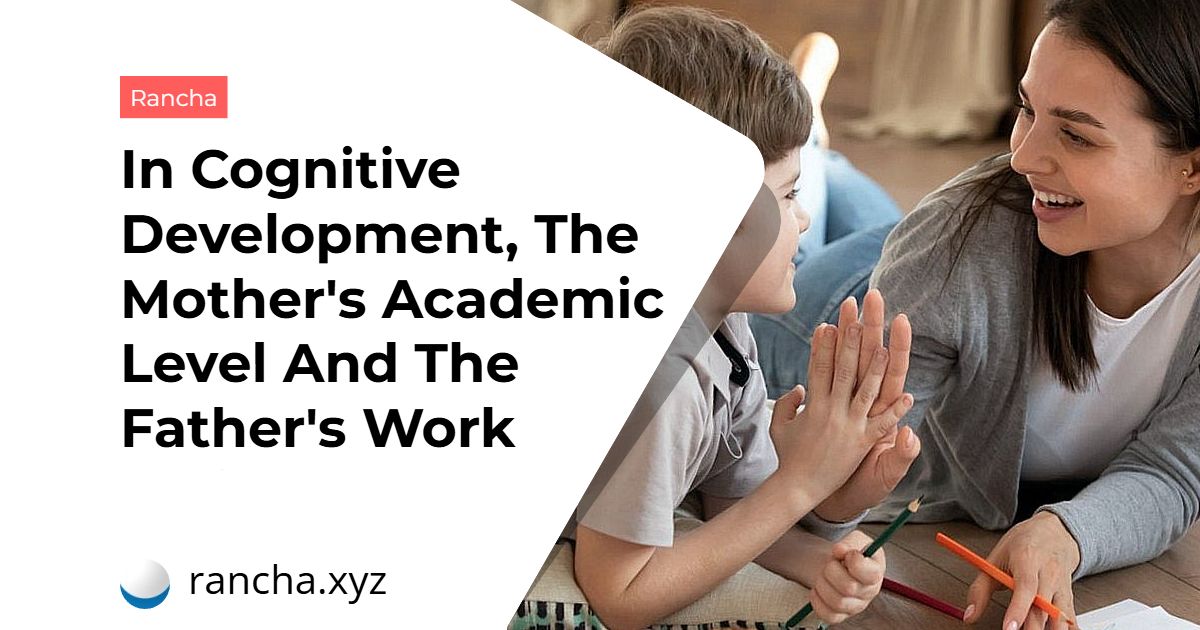We know that social stratification conditions child development. The support of a stable financial environment, as expected, is a factor that favors the development of children. Now, a current study suggests that the mother’s academic level and the father’s work weigh more heavily on cognitive development.
Parental income, education and occupation directly influence their children’s cognitive evolution. Discovering that there are differences in how parental conditions influence us is, to say the least, interesting. Unfortunately, disadvantaged homes are an obstacle to the development of minors.
Socioeconomic status remains one of the most studied variables to understand how children develop. We currently have more data to make us aware of the need to develop better mechanisms to promote equal opportunities among students.
Let’s learn more about the subject.

Children’s cognitive development depends on their parents’ position and studies.
It is important to clarify first that a child’s cognitive development and academic performance depend on multiple factors. There are single-parent families, for example, who, without having a high status, managed to take their children to university. By this we mean that the development of cognitive skills is based on many variables, but there are some that correlate more significantly.
Now, if until recently we knew that a financial environment in which needs are met favors child development, influencing the quantity and quality of opportunities that little ones can enjoy, there is a variable that we did not know about. Research work carried out by the Jaume I University of Castellón and the University of Valencia in Spain points to an interesting idea.
Mother’s education and father’s work improve cognitive development
The research was published in Gaceta Sanitaria , generating a considerable impact on the scientific community. In it, 525 children from five to six years old who belonged to different social contexts were followed. It was taken into account that there are three decisive factors in cognitive development:
- Family income.
- Parental educational level.
- Social status.
These three variables lay the foundations for greater interest, time and resources so that children have better academic opportunities. Well, now we know that, in addition to these factors already known, other points are also decisive:
- A good parent’s job (social status) provides security and stability in the home.
- On average, this financial stability means that the mother takes longer maternity leave and may even choose to stop working for the first few years. A good academic background on the part of the mother is associated with a good cognitive development of the children during this period.
The importance of job stability: less stress, more time, better nutrition
Let’s remember for a moment Abraham Maslow’s pyramid of basic needs. He indicated that the good development of the human being reaches its highest levels when some basic principles are contemplated (food, security, work, home, affection, etc.).
These principles are essential, especially during childrearing and even during pregnancy.
- Economic stability and work in a home favors a healthier pregnancy. In fact, this study found that disadvantaged families had babies who were smaller and more vulnerable to potential threatening agents of the environment.
- Mothers with good social status were also exposed to less polluting environments and had lower levels of stress during pregnancy.
- Likewise, this status added to a high educational level of the mother, favors that children have better psychomotor skills, verbal skills and executive functions (attention, memory, problem solving…).

For reflection: when social inequality chronicles poverty and even deficits in child development
It’s an undeniable fact. The impact of social stratification chronicles inequalities. That is, children who grow up in disadvantaged environments have fewer academic opportunities. The reason? It is common for them to drop out of studies earlier and school failure is greater in this population group. Not to mention how inadequate nutrition hinders the child’s correct cognitive development.
We emphasize, once again, that there may be exceptions; however, the data is there. The weight that poverty has on academic performance is significant. What solution is there for this? The problem, of course, is structural.
However, our social bodies can and should look for new mechanisms. We don’t just need more support for the labor market to favor more stable jobs for families. It is urgent that more programs be developed to compensate for this differential factor that causes so many inequalities.
 rancha.xyz Be free to choose their own route to self-knowledge, health and balance of body and soul.
rancha.xyz Be free to choose their own route to self-knowledge, health and balance of body and soul.




